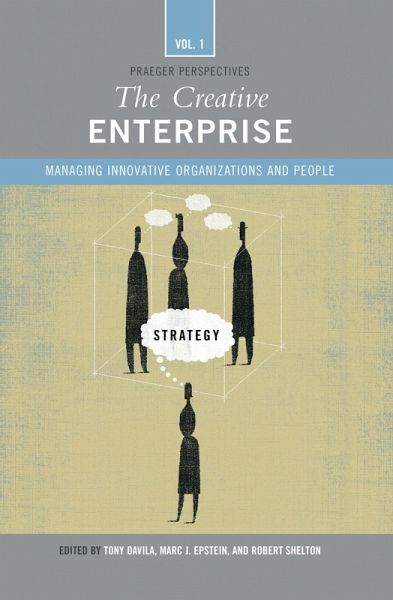
The Creative Enterprise (eBook, PDF)
Managing Innovative Organizations and People [3 volumes]

PAYBACK Punkte
51 °P sammeln!
Creativity is the lifeblood of any business-from fledgling startup to global giant, creativity is what inspires entrepeneurs to take the leap into the unknown, motivates project teams to design faster and better products, drives executives to set their sights on new markets and customers. The Creative Enterprise asks: where do these creative impulses come from, and how can they be channeled into profitable ventures? Contributions from scholars and practitioners around the world integrate insights from the fields of management, economics, technology, psychology, and sociology to shed new light ...
Creativity is the lifeblood of any business-from fledgling startup to global giant, creativity is what inspires entrepeneurs to take the leap into the unknown, motivates project teams to design faster and better products, drives executives to set their sights on new markets and customers. The Creative Enterprise asks: where do these creative impulses come from, and how can they be channeled into profitable ventures? Contributions from scholars and practitioners around the world integrate insights from the fields of management, economics, technology, psychology, and sociology to shed new light on innovation and how it drives business growth. Volume 1 focuses on innovation strategies, with chapters on developing the new product pipeline, technology transfer, and strategic alliances. Volume 2 considers the individual and organizational aspects of innovation, with chapters on the psychology of creativity and the influences of organizational culture on innovation. Volume 3 covers the infrastructure for promoting and sustaining innovation, with chapters on managing creative teams, selecting and funding projects, and developing effective performance measurement and rewards systems. Create-to make or bring into existence something new, derived from the Latin crescere, to grow. Creativity is the lifeblood of any business-from fledgling startup to global giant, creativity is what inspires entrepreneurs to take the leap into the unknown, motivates project teams to design faster and better products, drives executives to set their sights on new markets and customers. Where does this creativity come from? How can it be channeled into profitable ventures? The Creative Enterprise brings together the most current thinking from academics and practitioners around the world to shed new light on creativity and how it drives business growth. It addresses such topics as: Why are some organizations creative and others are not? What catalyzes new ideas? How can leaders balance short-term financial pressures and long-term creative aspirations? And how can firms maximize the value of their ideas into profitable products and services? While many authors have tackled pieces of the puzzle, this set uniquely integrates insights from the fields of management, economics, technology, psychology, and sociology, to cover the spectrum across individual and organizational innovation. Volume 1 focuses on innovation strategies, with chapters on developing the new product pipeline, measuring the impact of innovation on firm growth, technology transfer, and strategic alliances. Volume 2 considers the individual and organizational aspects of innovation, with chapters on creativity and artwork, idea catalysts and blocks, and the interplay between organizational culture and innovation. Volume 3 covers the infrastructure for promoting and sustaining innovation, with chapters on managing creative teams, selecting and funding projects, and developing effective performance measurement and rewards systems.













